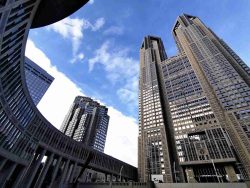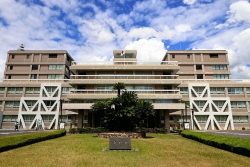Sense of Crisis must be Shared by All to Control Coronavirus / Work to Protect Employment, Livelihoods
13:45 JST, January 5, 2021
As long as there is no sign of the novel coronavirus pandemic being brought under control, the implementation of strong measures will be necessary. Utmost efforts must be made to contain the pandemic while paying attention to people’s livelihoods and employment.
At a New Year press conference, Prime Minister Yoshihide Suga expressed his intention to consider declaring another state of emergency. The government intends to target Tokyo, Saitama, Chiba and Kanagawa prefectures, where infections are high.
Since autumn last year when infection cases expanded again, the central and local governments have called on people to refrain from nonessential and nonurgent outings, among other measures. However, the number of people in shopping and entertainment districts in the Tokyo metropolitan area did not decrease much during the year-end and New Year periods.
■ Improve healthcare system
The prime minister said, “I take the current situation seriously and have come to think that a strong message is needed.” By declaring a state of emergency, the government apparently hopes that more people will share a sense of urgency.
The state of emergency would be declared under the special measures law to cope with new strains of influenza. It would be the first since former Prime Minister Shinzo Abe declared a state of emergency in April last year for seven prefectures, including Tokyo and Osaka, before expanding it nationwide and then lifting it gradually in May last year.
If the declaration is issued, there will be a clear legal basis for governors of affected areas to ask residents to refrain from going out and businesses to shorten their operating hours, among other measures.
Under the current law, in principle, there are no penalties for not complying with the various requests. It is up to residents and businesses to take specific actions.
It is important for society as a whole to cooperate to protect people’s lives and health. In addition to basic measures such as wearing masks and avoiding the so-called Three Cs of closed spaces, crowded places and close-contact settings, it is necessary to continue efforts to reduce the number of infections based on government requests.
The number of new infections and people with serious symptoms is on the rise, and hospital bed capacity is becoming tight in various parts of the country. Coronavirus variants that are believed to be highly infectious have also been found.
There is an urgent need to improve the medical supply system. The government should provide adequate allowances to doctors and nurses who treat coronavirus patients and more generous support to hospitals, such as through subsidies. It should also urge more medical institutions to accept patients.
Requests to shorten business hours have already pushed many dining establishments and other businesses to the edge. Some people may not be able to make ends meet if they lose their jobs or income. It is vital not to increase the level of bankruptcies and unemployment.
■ Support for businesses vital
The central government must use reserve funds and other resources to secure financial resources for local governments and to support the cash flow of businesses. It is worth considering, among other measures, further extending a special measure to increase the amount of employment adjustment subsidies, and providing additional benefits to help businesses sustain their operations.
When a state of emergency was declared last spring, governors in the Tokyo metropolitan area called on many businesses, including dining establishments, large-scale stores and amusement facilities, to suspend their operations or shorten their operating hours.
At the press conference, the prime minister indicated that even if a state of emergency is declared, dining establishments will be the main target of government calls for self-restraint and other measures. He is probably concerned that personal consumption will decline and the economy will further deteriorate.
In order to revive the economy, it is important to curb infections so that people can live their daily lives with peace of mind.
Although governors have the authority to implement various measures, they will not be able to gain broad cooperation unless the central government takes responsibility for steering the nation through the crisis. It must consult closely with local governments and swiftly announce the types of businesses that will be asked to suspend their operations or shorten their business hours, and the duration of the restrictions.
Blanket school closures are not being planned. The entrance examination season will soon be in full swing, with the Common Test for University Admissions to be held on Jan. 16 and 17. It will be a challenge to ensure entrance examinations are conducted without disruptions during a state of emergency.
Last spring, in the early stages of the pandemic, many people complied with nonbinding requests for self-restraint. Now, however, coronavirus crisis acclimatization and restraint fatigue are spreading.
■ National message needed
To broaden understanding of restrictions and business suspensions, the government must present a clear policy and call on the public to cooperate. The Suga administration has been slow to deal with the pandemic. It needs to continuously communicate with experts and take swift action.
At the press conference, Suga stressed the government’s plan to start vaccinations in late February. It is hoped that the central government will cooperate closely with municipalities, which will actually conduct the vaccinations of residents, as well as prefectural governments and medical institutions to ensure the process is rolled out smoothly.
The prime minister said that he would submit a bill to revise the special measures law to the ordinary Diet session. The bill includes a package of benefits for businesses and penalties for those who fail to comply with such requests as the suspension of operations.
The intention may be to ensure the effectiveness of the state of emergency, but is it appropriate to limit private rights by setting penalties? The issue must be carefully considered.
— The original Japanese article appeared in The Yomiuri Shimbun on Jan. 5, 2021.
Top Articles in Editorial & Columns
-

Riku-Ryu Pair Wins Gold Medal: Their Strong Bond Leads to Major Comeback Victory
-

Reciprocal Tariffs Ruled Illegal: Judiciary Would Not Tolerate President’s High-Handed Approach
-

China Provoked Takaichi into Risky Move of Dissolving House of Representatives, But It’s a Gamble She Just Might Win
-

Japan’s Plan for Investment in U.S.: Aim for Mutual Development by Ensuring Profitability
-

Flu Cases Surging Again: Infection Can Also Be Prevented by Humidifying Indoor Spaces
JN ACCESS RANKING
-

Producer Behind Pop Group XG Arrested for Cocaine Possession
-

Japan PM Takaichi’s Cabinet Resigns en Masse
-

Man Infected with Measles Reportedly Dined at Restaurant in Tokyo Station
-

Israeli Ambassador to Japan Speaks about Japan’s Role in the Reconstruction of Gaza
-

Videos Plagiarized, Reposted with False Subtitles Claiming ‘Ryukyu Belongs to China’; Anti-China False Information Also Posted in Japan




















